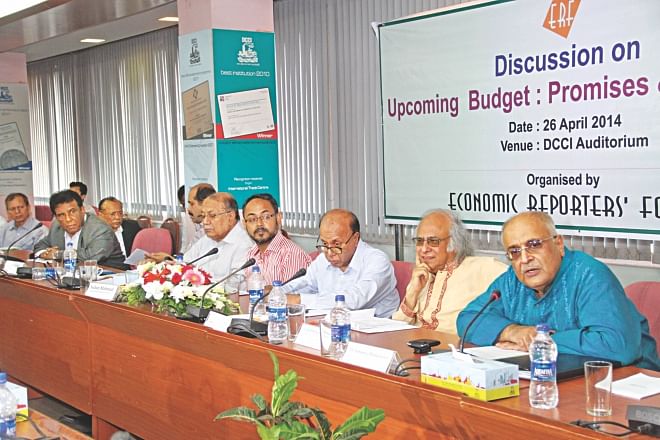Raising investment: the biggest challenge ahead

Boosting economic growth and investments will be the biggest challenges for the government in the upcoming fiscal year, economists and businesses said yesterday.
Rebuilding the damaged image of the readymade garment sector that accounts for nearly 80 percent of the country's total exports will be another tough task, they said.
They pointed out the issues at a discussion on “the upcoming budget: promises and challenges” organised by Economic Reporters' Forum (ERF) at the office of Dhaka Chamber of Commerce and Industry.
“Bangladesh is going through a barren spell of investment,” said Debapriya Bhattacharya, distinguished fellow of Centre for Policy Dialogue.
Trends show that both private and public investments will come down further this year, he said.
Private investment went down by one percentage point in fiscal 2012-13 compared to the previous year, he added.
Economic growth is projected to be the lowest in 10 years due to sluggish investment, he said, adding that the government has failed to carry on institutional reforms to boost investment and growth.
Bhattacharya said economic activities are yet to pick up even after the elections, which is reflected in major economic indicators except imports.
AB Mirza Azizul Islam, a former finance adviser to the caretaker government, said businesses are afraid of making any fresh investment though the country seems to be politically stable after the national election. “May be, it's the lull before the storm.” On the size of the upcoming budget, Islam said it should not be more than Tk 235,000 crore considering the income and implementation capacity of the government.
According to his calculation, the outlay for the annual development programme should not exceed Tk 67,000 crore in fiscal 2014-15.
He also called upon the government to cut allocation on defense expenditure and public administration cost.
Economist Qazi Kholiquzzaman Ahmad said, “Where there is investment, there is inflation.” He stressed sustainable development and reining in food inflation.
Ahmad also urged the government to focus more on employment generation and education in the upcoming budget.
Salehuddin Ahmed, a former governor of Bangladesh Bank, advised the government to provide incentives to boost growth of the manufacturing sector.
He said there is no need to make the ADP bigger. “It (ADP) should concentrate on basic infrastructure and information technology,” Ahmed said.
He also said Bangladesh should come out of the incremental budget model. “It can be expansionary, but have to be pragmatic,” he said.
Binayak Sen, a research director at Bangladesh Institute of Development Studies, said the country has been going through an image crisis globally after the Rana Plaza building collapse.
He urged the government to allocate more funds for infrastructure development, especially for railways, highways and intercity connections.
Sen also called upon the National Board of Revenue to collect more revenue from direct taxes. The NBR can earn a huge amount of revenues from property surcharge if it can adjust property prices in line with the municipality rates regularly.
Businesspeople focused on the challenges they are facing in the wake of the Rana Plaza disaster last year.
Atiqul Islam, president of Bangladesh Garment Manufacturers and Exporters Association, sought policy support to immediately relocate their factories to purposely-made buildings to ensure worker safety.
The government currently imposes 61 percent duty on the import of pre-fabricated building materials. “So, we want a full duty waiver on such items to minimise the relocation costs,” he said.
Though the number of risky buildings is not so high, around 17,500 people have so far lost jobs due to factory inspection, he said.
“Sluggish investment is a big challenge for the economy. Banks are sitting on idle funds due to a lack of investment demand,” said Abdus Salam Murshedy, president of Exporters Association of Bangladesh.
The government should announce an investment friendly budget to boost private sector economic activities, he said.
Kazi Akram Uddin Ahmed, president of the Federation of Bangladesh Chambers of Commerce and Industry, said the government should go for 'country branding' to rebuild the image that was dented after the Rana Plaza collapse.
Abdul Awal Mintoo, a former FBCCI president, said the country's economic growth has been on a downward trend due to poor capacity of various government agencies.
Farid Hossain, former bureau chief of AP, moderated the discussion, also attended by Mohammad Shahjahan Khan, DCCI president, Aftab ul Islam, president of American Chamber of Commerce in Bangladesh, Sultan Mahmud, ERF president, and Sajjadur Rahman, general secretary.

 For all latest news, follow The Daily Star's Google News channel.
For all latest news, follow The Daily Star's Google News channel. 




Comments